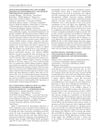 18 citations,
June 2017 in “Journal of The American Academy of Dermatology”
18 citations,
June 2017 in “Journal of The American Academy of Dermatology” Trichoscopy helps diagnose frontal fibrosing alopecia, even with unusual patterns.
 14 citations,
November 2016 in “Annals of Internal Medicine”
14 citations,
November 2016 in “Annals of Internal Medicine” Tofacitinib, an arthritis drug, helped hair growth in alopecia universalis but long-term safety needs more research.
 9 citations,
February 2019 in “Journal of Clinical Research in Pediatric Endocrinology”
9 citations,
February 2019 in “Journal of Clinical Research in Pediatric Endocrinology” Children with classic congenital adrenal hyperplasia have thicker heart fat and are at higher risk for heart problems and early atherosclerosis.
 6 citations,
May 2021 in “JAMA network open”
6 citations,
May 2021 in “JAMA network open” Babies who gain weight quickly, especially in the first 3 months, may start puberty earlier.
 6 citations,
December 2020 in “Dermatological reviews”
6 citations,
December 2020 in “Dermatological reviews” COVID-19 may worsen with androgens; anti-androgen drugs could help.
 September 2022 in “International Journal of Health Sciences and Research”
September 2022 in “International Journal of Health Sciences and Research” Resistance training improved BMI and menstrual regularity more in women with PCOS than aerobic training.
 July 2022 in “L Endocrinologo”
July 2022 in “L Endocrinologo” A 77-year-old woman with hair loss had high testosterone and 17OH-progesterone levels, but no significant findings on imaging.
 December 2020 in “Innovation in aging”
December 2020 in “Innovation in aging” Rapamycin treatment helps reduce brain inflammation and symptoms of mitochondrial disease by blocking specific pathways in mice.

Losing weight and eating better are key to managing metabolic syndrome and its related conditions.
 January 2014 in “S. Karger AG eBooks”
January 2014 in “S. Karger AG eBooks” Type 2 diabetes in youth is increasing, with high treatment failure rates and more severe than Type 1; certain drugs can lower lipid levels effectively with varying side effects, and apples may benefit heart health like statins but with fewer side effects.
 16 citations,
December 2021 in “Frontiers in Endocrinology”
16 citations,
December 2021 in “Frontiers in Endocrinology” Sex hormones may affect COVID-19 severity, with estrogen possibly reducing risk and testosterone potentially increasing it.
September 2024 in “Chemico-Biological Interactions” Finasteride improves heart function in obese and aging male rats by reducing oxidative stress and p53 protein levels.
40 citations,
May 2010 in “American Journal of Clinical Dermatology” AKN might be a skin marker for metabolic syndrome.
7 citations,
March 2021 in “IntechOpen eBooks” RF energy is used in medical and beauty treatments to heat tissues, tighten skin, and reduce fat safely.
50 citations,
May 2018 in “International journal of cardiology” Testosterone is linked to cardiovascular risk factors and stroke, but its exact role is unclear.
 50 citations,
January 2013 in “Indian Journal of Dermatology”
50 citations,
January 2013 in “Indian Journal of Dermatology” Some skin conditions, like psoriasis and early-onset baldness, may indicate metabolic syndrome, and others are linked to diabetes risk and cardiovascular issues.
20 citations,
December 2017 in “Cardiovascular diabetology” Linagliptin slows down premature aging in certain mice.
 15 citations,
September 2021 in “Frontiers in Endocrinology”
15 citations,
September 2021 in “Frontiers in Endocrinology” Hormone therapy increases the risk of heart-related issues in transgender women and may affect heart health in transgender men.
10 citations,
October 2018 in “Journal of molecular and cellular cardiology/Journal of Molecular and Cellular Cardiology” The gene NM_026333 slows down aging by affecting the NCX1 pathway and could be targeted for anti-aging treatments.
 7 citations,
September 2014 in “PubMed”
7 citations,
September 2014 in “PubMed” People with androgenetic alopecia (hair loss) may have a higher risk of developing metabolic syndrome.
 3 citations,
January 2021 in “Journal of Research in Medical Sciences”
3 citations,
January 2021 in “Journal of Research in Medical Sciences” Certain medications can impact metabolic syndrome, with some improving conditions like high blood sugar and others having no effect.
 1 citations,
October 2023 in “The Journal of nutrition, health & aging”
1 citations,
October 2023 in “The Journal of nutrition, health & aging” Higher hair levels of zinc and chromium were linked to less cognitive decline in very old people.
 1 citations,
June 2023 in “Nutrients”
1 citations,
June 2023 in “Nutrients” Vitamin D deficiency is linked to a higher chance of metabolic syndrome in women with PCOS.
 February 2024 in “Brain research bulletin”
February 2024 in “Brain research bulletin” Blocking androgen activity in newborn rats affects body weight and appetite-related hormones differently in males and females.

Men with male pattern baldness may have a higher risk of heart problems.
 November 2023 in “Biology”
November 2023 in “Biology” Lower hair copper and copper-to-zinc ratio are linked to more severe coronary artery disease.
May 2023 in “Journal of Cosmetic Dermatology” Androgenetic alopecia is linked to higher cardiovascular and metabolic risks, possibly due to irisin resistance.
September 2017 in “The journal of investigative dermatology/Journal of investigative dermatology” Male-pattern baldness has a weak link to heart disease and some related health conditions.

PCOS has a strong genetic basis, but more research is needed to fully understand it.
 4 citations,
March 2020 in “BMC Research Notes”
4 citations,
March 2020 in “BMC Research Notes” Skin tags in obese individuals may indicate higher cardiovascular risk.






















